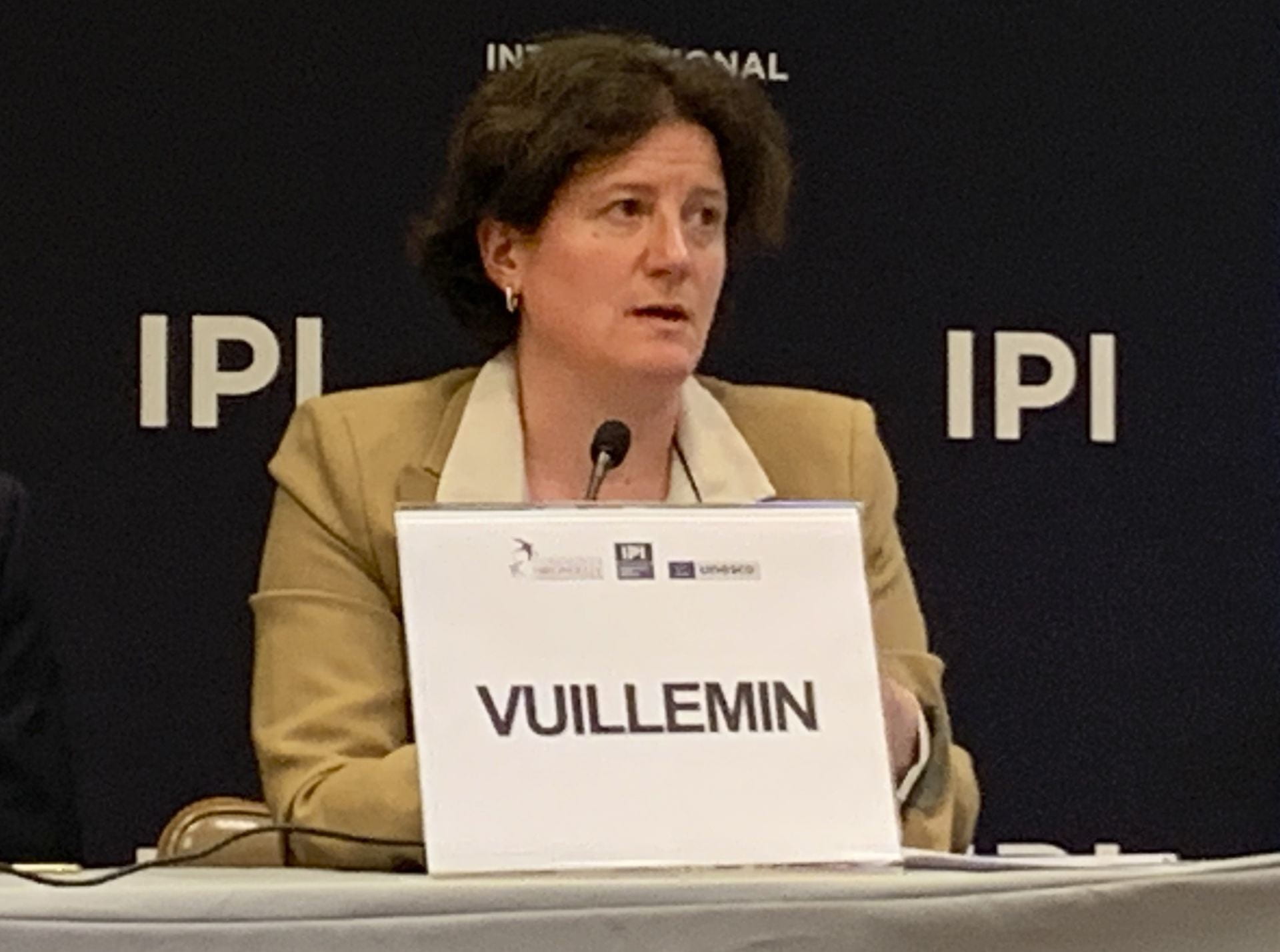UN Mission’s Radio Myrria supports peacekeeping efforts over the airways.

Caroline Vuillemin, executive director of Fondation Hirondelle, responds to questions about supporting fragile media landscapes at the 30 Years of Peacekeeping Radio: Lessons for UN Media in a Changing Information Environment event. Fondation Hirondelle and the International Peace Institute cohosted this policy forum to conclude the 2023 World Press Freedom Day activities.
NEW YORK — “Radio is king or to be gender-sensitive, radio is still queen,” said Ben Dotsei Malor, the Chief of Communication and Public Information for the United Nations Mission in South Sudan.
According to a survey conducted by UNMISS from January to March 2023, 60% of South Sudanese people stated that they received their news from radio — 80% of whom listen to Radio Myrria, the news service launched in 2006 by the UN Peacekeeping Mission. Radio Myrria preceded the 2011 establishment of the UNMISS mandate and the independence of South Sudan. The mandate aimed to support the development of the world’s newest nation, protect citizens, oversee human rights violations, assist humanitarian aid and promote the implementation of the peace agreement.
The radio “is the voice of peace,” in alignment with the UNMISS purpose. Radio Myrria provides a vital support system for the dissemination of peacekeeping information to the majority of South Sudan, including citizens, leaders, community influencers and government officials. The platform links the citizens together and also connects the citizens to those in power.
The station offers 16 hours of live daily programming, including music, talk shows, discussion programs, reports, and more. This UNMISS radio already covers 70% of South Sudan’s land mass, but according to Malor, there is a demand to extend the radio’s outreach even further. Malor is especially looking to increase youth programming, as South Sudan is the world’s youngest nation. As of 2022, roughly 72% of the 11 million population is under 30 years old.
Radio Myrria serves a diverse and loyal audience at an affordable and accessible rate. Battery-powered portable radios eliminate barriers to accessible information because they are inexpensive and do not require internet or cellular telephone networks. In a nation where one gigabyte for mobile internet has increased to $7 USD, in comparison to $0.84 USD in its neighboring country, Kenya, radios are an economical investment.
Other voices echo Malor’s point about the benefits of radio as a means of effective communication. Caroline Vuillemin, a fellow panelist and executive director of Fondation Hirondelle, the organization that originally started Radio Myrria in the capital Juba, shared how radio communicates with people at all levels of society, including those who are unable to read or write. In the context of radio, media literacy solely depends on the language that the content is transmitted through. Currently, Radio Myrria broadcasts its news in English and Juba Arabic; however, Malor hopes to offer additional languages in the future. This is just one way that the platform can increase its reach and inclusivity.
Vullemin offers a critical suggestion that “to promote an inclusive peace in a country then, really, [the UN] should strengthen independent and professional local media.” She suggests that the UN must empower the local media market, in South Sudan and across the region, by “strengthening the local voices of the people.” To achieve this, she recommends that the UN peace operation revise its mandate objectives and make them more clear, comprehensive and collaborative. The mandate’s goal, she argues, should explicitly promote equitable access to information throughout South Sudan’s digital landscape.
The UNMISS mandate was set to expire on March 15, 2023, however, the UN security council extended the mandate one more year due to conflict and insecurity in the region. The UNMISS headquarters, located in Juba, is roughly 1,600 kilometers from Khartoum, Sudan – a capital city overcome with civil war and political instability.
Prior to UNMISS’ transition out of the country, South Sudan is expected to hold its first election. Elections were originally set for 2022 however due to rampant violence, failure to implement the peace agreement and lack of sufficient voting infrastructure, they were postponed to December 2024. Radio Myrria, according to UNESCO affiliates, plays a fundamental role in voter education and participation to support the progress toward a national election.
There is a lot of change on the horizon for South Sudan — potential new governmental control and a transitional media landscape pose questions and concerns about the nation’s future and its peace.
In the meantime, Malor, the UNMISS team, and Radio Myrria will continue to “consolidate peace, bring democracy, and ensure that human rights are not abused” by providing “credible, balanced and timely information” in South Sudan.

